It is hard to
imagine, in today's world where pulp fictions are fashion items, where
amoral heroes are the rule rather than the exception, where lukewarm
pastiches of the great seedy films and stories of the 40s and 50s turn
into megahits and lifestyle trendsetters, just what sort of impact the
Parker novels had when they appeared in the 1960s.
Richard Stark's series about a professional thief who specialised in
often-complicated capers, grew out of the last gasps of the pulp world
in the early 60s. This is the world of Jack Ruby's strip club, of men in
narrow ties driving cars with big fins, of an underbelly to the
otherwise complacent Eisenhower years. It is a world which the bright
lights of the Kennedy years eventually blew away, a world which the
suburban baby-boom generation didn't know existed.
By the time the movie POINT BLANK tossed
that world into our faces, the Parker series was switching paperback
publishers with confusing regularity, but also attracting a growing and
fiercely loyal 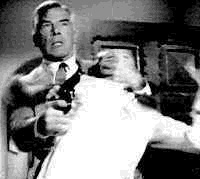 following.
It was when those baby-boomers, raised on a diet of James Bond and I
Spy, discovered the dark side of crime fiction that the Parker books
took off. POINT BLANK, BONNIE AND CLYDE, EASY
RIDER and other movies signalled the rise of the criminal as, if
not hero, then star. following.
It was when those baby-boomers, raised on a diet of James Bond and I
Spy, discovered the dark side of crime fiction that the Parker books
took off. POINT BLANK, BONNIE AND CLYDE, EASY
RIDER and other movies signalled the rise of the criminal as, if
not hero, then star.
As this happened, it was also becoming general knowledge that Richard
Stark was the pen name of Donald Westlake, the prolific novelist who was
also producing comic mainstream novels, suspense novels, and a series of
caper novels, starting with THE HOT ROCK,
about the Dortmunder gang, a sort of Keystone Kops version of Parker's
crews.
Not that it mattered. The blurbs of Parker paperbacks were unusual in
that they could be believed. "Nobody tops Stark in his objective
portrayal of a world of total amorality" said the New York Times.
Unusually, The Times was both understated and correct. How much more
hardboiled could the advertising on the covers of the Gold Medal
editions be? "Parker steals. Parker kills. It's a living."
That blurb caught perfectly the tone of the best Parker stories, which
is matter of fact, fast-paced, and ruthless. Despite the deft way
Westlake can take a simple formula and improvise endlessly upon it, it
is the character of Parker himself which makes the books work.
Parker (no first name) is a professional. He steals for a living, and
he lives his life to facilitate that function. Once he is engaged in a
job, Parker's attitude toward his fellow humans becomes one of almost
total psychotic detachment, yet he is no psychotic. He is not totally
human, either, at least not after the plastic surgery he receives in the
second novel. But other humans are often mere props, obstacles,
difficulties, which need to be overcome or removed. If he needs
information, and the person who has it decides to play tough, Parker
will respond with torture. Not because he enjoys it, but because he is
not playing a role.
Parker can show human qualities. He will joke
with his partners, not because he finds the joke funny, but because he
knows this sort of behaviour is what they expect and it will put them at
ease. He can show just enough affection to a woman to keep her from
becoming an emotional problem. But in general, he has no interest in
women while he's on a job. But he does feel a need immediately after
one. Did I say psychopath?
As a professional, Parker also has a certain honour, a moral code as
well developed as that of Hammett's Continental Op. But he works in a
business whose currency is betrayal, and double-cross fuels many of the
Parker novels.
Westlake maintained this hard-edged, flat, fast-paced tone through
almost all the 16 Parker novels he produced between 1962 and 1973.
Although he struck gold with the Dortmunder books (and their movies)
Parker had achieved cult status, and that status has been maintained
ever since. So it comes as a surprise that, a year after the American
publication of the first Parker novel in 24 years, COMEBACK
is still unpublished in Britain, and in fact, Alison & Busby, the UK
publisher of the Parker series, had been unaware of it when it was
published in the States.
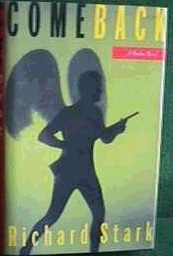 COMEBACK is classic Parker. The rip-off is
a big one: the box-office takings of a Christian crusade. The plan has
its little twist of absurdity: a crook dressed as an angel. There is the
usual element of the heist which seems ridiculously obvious in
retrospect, and makes you wonder why you didn't think of a robbery like
that yourself. And of course there is betrayal, and when you
double-cross Parker, you soon learn you shouldn't.
COMEBACK is classic Parker. The rip-off is
a big one: the box-office takings of a Christian crusade. The plan has
its little twist of absurdity: a crook dressed as an angel. There is the
usual element of the heist which seems ridiculously obvious in
retrospect, and makes you wonder why you didn't think of a robbery like
that yourself. And of course there is betrayal, and when you
double-cross Parker, you soon learn you shouldn't.
There are a couple of changes that two and half decades have wrought.
We have a kinder, gentler Parker now. He actually seems to enjoy himself
when he plays an amusing role, and occasionally he evinces signs of
humanity that would've worried him way back then. And he's also a more
politically correct Parker. His long-suffering woman, Claire, has now
become part of his crew, and is a capable 90s liberated woman, rather
than the sit-at-home partner waiting for Parker to come home and revert
back to his "human" persona after a job. But nothing has
changed with Stark's spare prose. It may be a little richer than it was,
but maybe after all these years it's hard for Westlake to revert to his
schizophrenic persona again (and let's not even talk about Tucker Coe!).
Perhaps, like Parker, he's mellowing. Whether he is or isn't, let's hope
Stark has a few more novels left in him, and that someone sees fit to
publish them in this country.
THE PARKER NOVELS
The variations in titles are usually the
result of changing publishers. A couple (MADE IN USA and THE SPLIT)
reflect movie titles based on the original novels.
POINT
BLANK (1962) (aka THE HUNTER)
THE MAN WITH THE GETAWAY FACE (aka
THE STEEL HIT) 1963
THE OUTFIT 1963
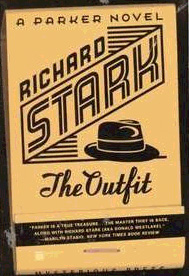 THE MOURNER 1963
THE MOURNER 1963
(I would assume that the first four books were sold as a package,
originally published by Pocket Books, they were reissued (and two
retitled) out of sequence by Berkeley.
POINT BLANK opens with a double-cross, with Parker left for dead and
evetually arrested for vagrancy, his only fall. The double- crosser sets
himself up with "the outfit", so when Parker gets his revenge
he also incurs the wrath of the organisation, and the next two novels
match Parker v organised crime, with no bets on who wins. THE MOURNER
uses a gun from THE OUTFIT to tie Parker into a story which is a take
off on THE MALTESE FALCON).
THE SCORE (aka KILLTOWN) 1964
Parker robs an entire town.
THE JUGGER (aka MADE IN USA) 1965
THE SEVENTH (aka THE SPLIT) 1966
RUN LETHAL 1966 (In 1967 Gold
Medal picked up the series and tried to market it with titles designed
to appeal to the MAN FROM UNCLE/MATT HELM audience which was huge at
that time. The four novels which follow are very similarly structured
caper novels, with the targets changing the formula slightly, and Parker
acting out of character in the fourth.
THE RARE COIN SCORE 1967
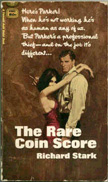
THE GREEN EAGLE SCORE 1967
THE BLACK ICE SCORE 1968
THE SOUR LEMON SCORE 1969 Parker
shows compassion to a double-crosser!
SLAYGROUND 1969
DEADLY EDGE 1971
PLUNDER SQUAD 1972 Parker's
compassion comes back to haunt him.
BUTCHER'S MOON 1973
As Stark, Westlake also wrote four novels featuring Alan Grofield, an
underemployed actor in the "legitimate" stage makes his first
appearance in KILLTOWN. Grofield supplements his meagre acting income by
working as a thief. In RUN LETHAL, Parker rescues him from an island in
the Gulf of Mexico after he's wounded during a heist in a gambling
casino. Parker leaves him in Mexico, which is where the first Grofield
novel THE DAMSEL begins. The second Grofield book, THE BLACKBIRD, begins
with the same scene that starts SLAY GROUND: an armoured car heist which
goes wrong when a shaky driver crashes the getaway car. Parker and
Grofield go their separate ways and get their separate stories! The
other Grofield novels are THE DAME and LEMONS NEVER LIE.
I've always thought Grofield was part of the inspiration for Lawrence
Block's Bernie Rhodenbarr. Block has been the most successful schizoid
crime writer since Westlake, with his tales of Matt Scudder alternating
with the light comedy of Rhodenbarr. It is also worth noting that Joe
Gores' skip-tracer, Dan Kearney, appears in PLUNDER SQUAD. That
appearance was also chronicled in Gores' first DKA novel, DEAD SKIP,
which may be the first cross-over appearance by series characters from
other writer's novels.
THE PARKER FILMS
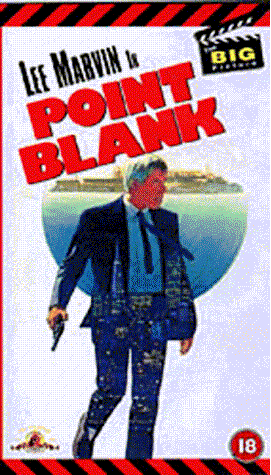  POINT
BLANK dir: John Boorman (Lee Marvin, Angie Dickinson,
KeenanWynn, Carroll O'Connor, Lloyd Bochner, John Vernon) One of the key
movies of the 60s, POINT BLANK turns film noir in on itself, with a
doomed hero/villain whose violence is the essence of his existence. It
is interesting that foreign directors made the first two movies taken
from Stark's books: perhaps seeing more in the portrayal of the
underbelly of America than the US audience itself. It should be said
that what Boorman saw was both the unrepressed violence and the
repressed homosexuality of the Parker character: if you want to draw a
conclusion you're free to. Parker (here called Walker) is betrayed by
his partner (here renamed Reese and played by John Vernon). In a party
scene, Walker and Reese roll around on the floor in a barely concealed
parody of love-making; the point is reinforced when we later see Walker
in a woman's bathrobe applying makeup to his face (to cover a bruise).
The film's ending is also classic, with Marvin trapped in the shadows of
Alcatraz, too wary to approach the money left for him by Keenan Wynn
(and perhaps dying as he watches it). The sniper, by the way, was played
by James B Sikking, who reprised the role ironically in Hill Street
Blues. POINT
BLANK dir: John Boorman (Lee Marvin, Angie Dickinson,
KeenanWynn, Carroll O'Connor, Lloyd Bochner, John Vernon) One of the key
movies of the 60s, POINT BLANK turns film noir in on itself, with a
doomed hero/villain whose violence is the essence of his existence. It
is interesting that foreign directors made the first two movies taken
from Stark's books: perhaps seeing more in the portrayal of the
underbelly of America than the US audience itself. It should be said
that what Boorman saw was both the unrepressed violence and the
repressed homosexuality of the Parker character: if you want to draw a
conclusion you're free to. Parker (here called Walker) is betrayed by
his partner (here renamed Reese and played by John Vernon). In a party
scene, Walker and Reese roll around on the floor in a barely concealed
parody of love-making; the point is reinforced when we later see Walker
in a woman's bathrobe applying makeup to his face (to cover a bruise).
The film's ending is also classic, with Marvin trapped in the shadows of
Alcatraz, too wary to approach the money left for him by Keenan Wynn
(and perhaps dying as he watches it). The sniper, by the way, was played
by James B Sikking, who reprised the role ironically in Hill Street
Blues.
MADE IN USA
1967 dir: Jean-Luc Goddard (Jean-Pierre Leaud, Anna Karina) The
screenplay, by Goddard, says it's based on THE JUGGER, but you'll have a
hard time trying to figure out how. With characters called Richard
Widmark, Donald Siegel, and David Goodis, and killers named Richard
Nixon and Robert McNamara, Goddard appeared to be drawing a link between
the America portrayed in the film noir/pulp fiction which the French
love, and the real America, the one which was engaged in the Vietnam war
and involved in the assassinations of leaders like JFK and Ben Baraka. "This
is like a Disney film, but one that stars Humphrey Bogart," was
Karina's take on it, but remember, this was the Sixties .
THE SPLIT 1968 dir:
Gordon Flemyng (Jim Brown, Diahann Carroll, Julie Harris, Ernest
Borgnine, Gene Hackman, Jack Klugman, James Whitmore, Donald Sutherland,
Warren Oates Parker meets blaxploitation! This isn't a great movie, but
it's an interesting one, partly because Jim Brown brings a different
sort of amorality to the role, and partly because the supporting cast is
so good, including early turns by Oates, Sutherland, and Hackman.
Borgnine is particularly over-the-top, trying to manhandle Brown in an
eerie echo of POINT BLANK.
THE
OUTFIT 1974 dir: John Flynn (Robert Duvall, Joe Don Baker,
Robert Ryan, Karen Black, Richard Jaekel, Sheree North, Joanna Cassidy,
Marie Windsor One of the most underrated and neglected crime films of
the 70s, and one of the best. Flynn catches both the atmosphere of
Parker's world, which is, after all, an underworld, and the tone of the
Stark novels, which is basically businesslike. Duvall matches Marvin in
his portrayal. Where Marvin always suggests violence about to explode
out of control, Duvall (here called Macklin) catches Parker's essence,
where violence is a tool. But there is also the sense that Macklin sees
people as objects put in the way of a successful job, and they need to
be dealt with as such. In the novel, there's a wonderful scene where
Parker admires a woman in bed, just after a hitman has tried to kill
him. "She was a good animal" he thinks. Duvall's relationship
with Karen Black in this film is drawn in much the same way, but
actually deepens slightly, as Duvall starts to humanise the character
slightly.
This was, I believe, Robert Ryan's last role,
and one of his best, as the crime boss who simply wants Macklin out of
the way.
SLAYGROUND
1984 dir: Terry Bedford (Peter Coyote, Billie Whitelaw, Mel Smith,
Philip Sayer) This opens very well, with the famous car crash that ruins
the armoured car job, but it drifts all over the place after that,
winding up in a Britain at a seaside funhouse. Go figure. Coyote is
surprisingly good in a role that on the surface seems totally miscast.
Billie Whitelaw makes a welcome appearance, and Mel Smith turns in a
performance reprised by Robbie Coltrane in Neil Jordan's MONA LISA. The
theory about foreigners understanding Stark's America better falls to
pieces with this turkey.
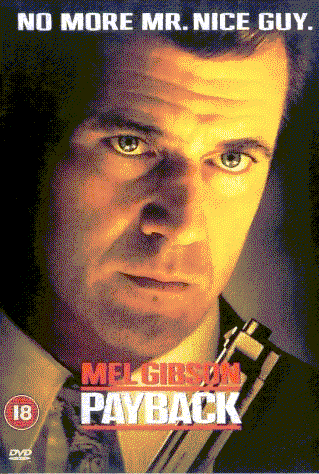  PAYBACK
1999 dir: Brian Helgeland (Mel Gibson, Gregg Henry, Lucy Alexis Liu,
James Coburn Mel Gibson told interviewers he wanted to play a character
who was 'morally reprehensible', but of course in Parker's world, he's
actually the least reprehensible character around, because he is always
honest within his own frame of reference. It's more likely that Gibson
saw a chance to play a tough guy in a T-shirt as a way of doing for his
career what Bruce Willis had done with DIE HARD and then PULP FICTION,
and broaden his type. In any event, his character (here called Porter-I
don't know why they never just call him Parker, but there you are)
starts out tough but is softened considerably along the way. Part of
this apparently was a studio or Gibsonian reaction to the hard edges
which came through in Gibson's original portrayal; give him credit, he
doesn't start out trying to be glamorous. But, as the story goes,
director Helgeland refused to re-shoot some scenes to allow Gibson to
make his character more likeable, so he was fired and the new scenes
were reshot by Paul Abascol, whose previous occupation was hairdresser
to Mel Gibson. Helgeland did a nice job of abstracting Porter's world:
he seems to be operating in the same New York used for the Shadow movie,
and it is strangely atemporal. One key plot element even involves the
use of a rotary phone-cars seem to be 1960s, which is the era of the
novel, but otherwise the city seems almost futuristic. And the Uzi
wielding Chinese gangs are right out of the 90s. There are subtle
changes in the other main characters as well. Porter's wife moves from
being a pill head to a junkie, and her death from a heroin OD is more
chilling, perhaps more self-induced, and certainly creates more
motivation for Porter to chase down his ex-partners. Where Parker was
helped by one of the syndicate bosses in the novel, in the film Porter
is both helped and pursued by two corrupt cops, a nicely done creation.
And here Porter calls on an old hooker/girlfriend for help; he once was
her 'driver'. It's hard to think of Stark's Parker pimping or driving
for whores. The other main change is in his double-crossing partner,
here called Mal Resnick again. Gregg Henry has a field day playing Mal
as a masochistic creep, who enjoys taking a beating from Lucy Liu (again
giving mainstream America a cheap sexual thrill, as she did with lesbian
scenes in Ally McBeal-being freed, as it were, from her more painful
bondage to TV's palp). The undertone of homosexual bonding from
Boorman's film is gone, subsumed beneath Mal's 'kinkier' perversion.
We're left to wonder why Porter ever trusted this bozo in the first
place. There are lots of other things to like in Payback, including
James Coburn's performance in the role originally played by Caroll
O'Connor. But because a Mel Gibson vehicle can't afford to bury his
'star' quality beneath the lean, boring workaday world of Parker the
thief, the essence of Stark never really seeps through. The novel The
Hunter ends with Paker escaping the cops, only to discover he's grabbed
the wrong suitcase and left his loot behind. Although that's really his
own fault, he decides to blame the syndicate, and decides he will hit
them to get his money back (Westlake would reprise that revenge motive
later in the series). Where Point Blank ended with death and ambiguity,
here Porter gets the dough, and the girl, and a car to make his getaway.
Parker's life is rarely so simple, or so sweet. PAYBACK
1999 dir: Brian Helgeland (Mel Gibson, Gregg Henry, Lucy Alexis Liu,
James Coburn Mel Gibson told interviewers he wanted to play a character
who was 'morally reprehensible', but of course in Parker's world, he's
actually the least reprehensible character around, because he is always
honest within his own frame of reference. It's more likely that Gibson
saw a chance to play a tough guy in a T-shirt as a way of doing for his
career what Bruce Willis had done with DIE HARD and then PULP FICTION,
and broaden his type. In any event, his character (here called Porter-I
don't know why they never just call him Parker, but there you are)
starts out tough but is softened considerably along the way. Part of
this apparently was a studio or Gibsonian reaction to the hard edges
which came through in Gibson's original portrayal; give him credit, he
doesn't start out trying to be glamorous. But, as the story goes,
director Helgeland refused to re-shoot some scenes to allow Gibson to
make his character more likeable, so he was fired and the new scenes
were reshot by Paul Abascol, whose previous occupation was hairdresser
to Mel Gibson. Helgeland did a nice job of abstracting Porter's world:
he seems to be operating in the same New York used for the Shadow movie,
and it is strangely atemporal. One key plot element even involves the
use of a rotary phone-cars seem to be 1960s, which is the era of the
novel, but otherwise the city seems almost futuristic. And the Uzi
wielding Chinese gangs are right out of the 90s. There are subtle
changes in the other main characters as well. Porter's wife moves from
being a pill head to a junkie, and her death from a heroin OD is more
chilling, perhaps more self-induced, and certainly creates more
motivation for Porter to chase down his ex-partners. Where Parker was
helped by one of the syndicate bosses in the novel, in the film Porter
is both helped and pursued by two corrupt cops, a nicely done creation.
And here Porter calls on an old hooker/girlfriend for help; he once was
her 'driver'. It's hard to think of Stark's Parker pimping or driving
for whores. The other main change is in his double-crossing partner,
here called Mal Resnick again. Gregg Henry has a field day playing Mal
as a masochistic creep, who enjoys taking a beating from Lucy Liu (again
giving mainstream America a cheap sexual thrill, as she did with lesbian
scenes in Ally McBeal-being freed, as it were, from her more painful
bondage to TV's palp). The undertone of homosexual bonding from
Boorman's film is gone, subsumed beneath Mal's 'kinkier' perversion.
We're left to wonder why Porter ever trusted this bozo in the first
place. There are lots of other things to like in Payback, including
James Coburn's performance in the role originally played by Caroll
O'Connor. But because a Mel Gibson vehicle can't afford to bury his
'star' quality beneath the lean, boring workaday world of Parker the
thief, the essence of Stark never really seeps through. The novel The
Hunter ends with Paker escaping the cops, only to discover he's grabbed
the wrong suitcase and left his loot behind. Although that's really his
own fault, he decides to blame the syndicate, and decides he will hit
them to get his money back (Westlake would reprise that revenge motive
later in the series). Where Point Blank ended with death and ambiguity,
here Porter gets the dough, and the girl, and a car to make his getaway.
Parker's life is rarely so simple, or so sweet.
 |